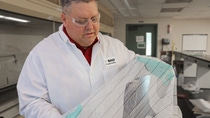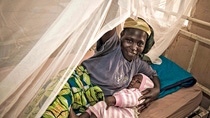Media
Destructive dinosaurs - a scientist fighting the most dangerous species on earth

Around the world, a child dies from malaria every two minutes – a tragic statistic Dr. James W. Austin is trying to fight. As a research expert for insects and biological pest systems, James is part of the team behind BASF’s Interceptor mosquito nets to eradicate vector-borne diseases – those caused by parasites transmitted by mosquitoes and other insects. While an entomologist does not seem to be a common profession within a chemical company, James has been working for BASF for more than 11 years.
As an entomologist, your research focus is on insects. How did you come to work for BASF?
It is not unusual for an entomologist to join a company that develops products for agriculture and pest control. Understanding dynamic biological pest systems and basic biochemical, behavioral and developmental processes for free-living organisms is essential to guiding formulation product development. I worked in pest control in the past and conducted product evaluations for many chemical companies. It was an easy decision for me to join BASF – an industry leader that sets the standard other large agrochemical manufacturers try to match.
What drives you?
What would you guess is the most dangerous species on earth? It is not sharks, scorpions or snakes. It is the mosquito – it causes more human deaths every year than any other animal. When it comes to malaria, we still experience almost half a million deaths every year, 90% of which occur in children aged five and younger, and most of them in African countries. Over the course of just one hour, approximately 30 kids will have died from malaria – although it is a completely preventable disease. Helping to prevent distress, disease and damage is what motivates me to work on such complex issues.
What is the Interceptor project?
Our Interceptors are long-lasting insecticidal nets that are designed to protect sleepers from disease-carrying insects, specifically mosquitoes. We recently brought our newest generation of this solution to life. Given a resurgence in insecticide-resistant mosquito populations in recent years, our Interceptor G2 nets come with two active ingredients that work against resistant mosquitoes which reduces malaria burden in affected countries. The two insecticides work together in an eloquent way. Alphacypermethrin is based on conventionally-used chemistry that kills non-resistant mosquitoes relatively quickly. The other insecticide applied on these nets is chlorfenapyr, a very different and complementary kind of chemistry with a physiological mode of action that works to deplete mosquito energy and controls both resistant and non-resistant mosquitoes. Interceptor G2 provides significantly better protection against mosquitoes than any other net currently available.
We developed the Interceptor G2 nets with the help of the Innovative Vector Control Consortium (IVCC) and the London School of Hygiene & Tropical Medicine. We are very proud of our agreement with MedAccess and the Bill & Melinda Gates Foundation that will facilitate the supply of 35 million nets over the next four years to combat malaria in sub-Saharan Africa. Many people and organizations support our efforts and it is very rewarding to be part of the solution to this very serious problem.
It’s not that insects are bad, it is just when they decide to do something bad that I like to step in.
Is this a business or charity?
BASF’s public health efforts have always been conducted with focus on value for society rather than major commercial gain. The Interceptor and Interceptor G2 projects are very special to me because they demonstrate BASF’s willingness to pursue solutions that benefit the poorest of the poor, providing a life-saving, life-changing solution to these people. It is a great project and I feel very privileged to contribute.
What are insects for you? Friends or enemies?
I grew up in Texas, a warm weather environment where you are confronted with insects all the time. A family acquaintance of my father had a pest control company and I started working for them many years back. That is how I experienced the value of applied biology: people had real problems and were being impacted by the presence of arthropods.
On the other hand, insects are kind of living dinosaurs, because they've been around for millions of years. They have learned to adapt and they are fascinating to work with. It’s not that insects are bad, it is just when they decide to do something bad that I like to step in. Termites, for example, with their social behaviors, working as a supraorganism are extremely interesting. But if they decide to go after your house, they are extremely destructive. That is why I am currently working on a solution to remotely monitor subterranean termites, changing a reactive market to a proactive one. The early warning system helps homeowners identify a potential termite attack and to implement defensive measures before they damage homes.
Saving lives, saving homes. What else makes your job so special?
BASF really has afforded me the opportunity to travel around the world. One of the most rewarding aspects of my job is interacting with different people all over the globe. The opportunity to go to very remote places and get in contact with people, especially the children, who very rarely meet outsiders is extremely rewarding to me.
I spend quite a bit of time in Africa and Asia, but also the U.S., South America, Australia and Japan. I enjoy supporting all the different regional public health projects and helping to review, draft and track protocols, and conduct research. There are so many places in the world I have travelled to, so many more I wish to see, and I look forward to new opportunities to see more.
About the team
For more than eleven years, James has been a member of the Public Health team at BASF, working on the development of the Interceptor nets. Other team members are: Achim Reddig (Head of Public Health), Dr. Susanne Stutz (Project Manager), Dr. Volker Frenz (Development Chemist), Holger Mueller (Supply Chain and Production Manager), Sarah Quinto (Order Processing), Alexander Heimsch (Business Manager) and Dr. Patrick Frettinger (Regulatory Affairs).
For media inquiries and questions, please contact: katharina.meischen@basf.com.
